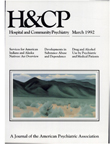Factors Related to Emergency Commitment of Chronic Mentally Ill Patients Who Are Substance Abusers
Abstract
A total of 247 chronic mentally ill patients committed for emergency involuntary hospitalization in a public intensive treatment unit were grouped on the basis of positive or negative urine toxicology screens for psychoactive substances at admission. Patients whose screens were positive for substance abuse were more likely to live alone or to be homeless, to be committed for making threats, and to have a diagnosis of organic mental disorder or substance abuse disorder. Patients who screened negative were more likely to live in a supervised setting, to be committed for actions such as assaults and suicidal behavior, and to have a diagnosis of schizophrenia or other psychotic disorder.
Access content
To read the fulltext, please use one of the options below to sign in or purchase access.- Personal login
- Institutional Login
- Sign in via OpenAthens
- Register for access
-
Please login/register if you wish to pair your device and check access availability.
Not a subscriber?
PsychiatryOnline subscription options offer access to the DSM-5 library, books, journals, CME, and patient resources. This all-in-one virtual library provides psychiatrists and mental health professionals with key resources for diagnosis, treatment, research, and professional development.
Need more help? PsychiatryOnline Customer Service may be reached by emailing [email protected] or by calling 800-368-5777 (in the U.S.) or 703-907-7322 (outside the U.S.).



